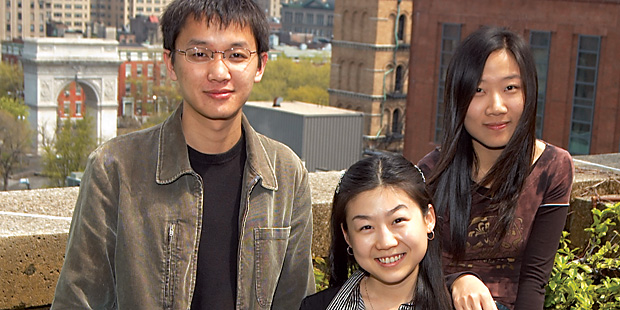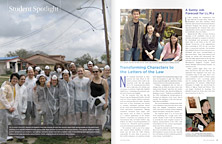Transforming Characters into Letters of the Law
Printer Friendly VersionNYU students interested in international law have flown to the farthest corners of the earth to do important work. But last spring five LL.M. ’06 students from China had to walk only a few blocks east of campus to perform a legal task of global significance: translating international case law from Chinese into English.
The five students—Kun Fan, Bin Hu, Taotao Ling, Jun Wang and Fan Wei, who all took Vice Dean Clayton Gillette’s domestic and international sales law class—donated their time to Pace University Law School to translate arbitration opinions issued by the China International Economic and Trade Association Commission. “Having translated decisions from major trading nations such as China is essential to a uniform application of the United Nations’ Convention on Contracts for the International Sale of Goods (CISG),” says Gillette, the Max E. Greenberg Professor of Contract Law. “They’ll be used by practitioners and academics around the globe.”
The students’ work is part of an expansive, shared online database of international case law from the CISG. Nations responsible for more than 75 percent of the world’s commerce, 67 countries in total, have adopted this standardized legal treaty since its inception in 1980. The CISG promotes equity through the regulation of sales contracts between international entities.
“Voltaire complained that he had to change laws as often as horses when traveling across Europe,” says Pace law professor Albert Kritzer, who started building the database in 2004. “Uniform accessibility of the CISG, including the interpretations in decisions on disputes, is the ‘more’ that is needed. The database is the tool that provides this accessibility.”
The current database contains more than 1,700 arbitration cases that have been translated into English. Translations include CISG cases from Germany, Russia, Belgium, Austria and Spain, among other nations.
The students spent 12 to 20 hours per week translating two 10-page cases every month. Thanks to their work, the database is currently the most complete resource of Chinese interpretations of the CISG, with China likely to be the country reporting the most cases when completed.
Though the students worked without pay, they were rewarded in other ways. “After my first translation was put on the site,” says Hu, “one of Professor Kritzer’s students quoted it in her thesis. I was thrilled.”

